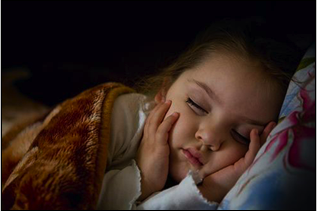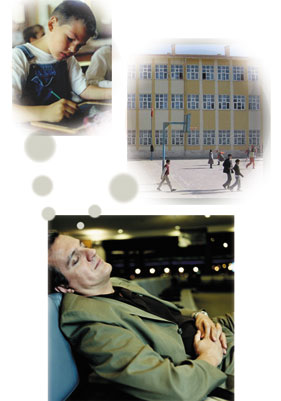 Every person spends one third of his or her life by sleeping. Sleep, which is a great miracle that we experience every single day, is not simply a resting period for all systems of the body going into a passive state. This is because the body enters into an active renewal process during sleep. Now let’s see how the human body renews itself in sleep.
Every person spends one third of his or her life by sleeping. Sleep, which is a great miracle that we experience every single day, is not simply a resting period for all systems of the body going into a passive state. This is because the body enters into an active renewal process during sleep. Now let’s see how the human body renews itself in sleep.
Sleep is among the critical necessities of human life. Our body needs sleep as much as it needs water, oxygen and food. Since one third of our life passes in sleep, a refreshing sleep is of vital importance in order to maintain a balanced life. Sleep is not a state of passive resting. During sleep, activities that occupy one’s mind; stress and information in one’s memory are cleaned out as if formatting computer memory. Hormone levels are stabilized, the digestive system works, the immune system steps in and the skin is reconfigured in sleep. Cell division continues intensively in sleep.
What is renews in sleep
Our skin can only stay smooth by discarding 10 grams of dead skin cells every day. In order for this to happen, the cells in the top layer of our skin begin to divide every evening. During sleep, this reaction quickens with the growth hormone increasing. The silence of the night is the perfect environment for this. Because at night neither the Sun nor the wind or movement can disrupt cell division. During these renewal hours, the skin requires a series of nutrients, particularly oxygen. With each breath taken, the skin stores the oxygen it needs. Therefore, specialists advise the bedroom to be thoroughly vented before going to bed at nights. When sleeping especially in the hours we dream, the organism begins to produce large amounts of water as the body temperature increases by 2 degrees. Therefore, when we wake up in the mornings, our hair is moistened and misshaped. Because sebaceous glands are renewed at nights, sebiparous is low during sleep. Therefore, those with dry skin wake up to an even drier skin in the mornings. Sleep specialists have found that the level of growth hormones in our sleep show a sudden increase as soon as we fall into sleep. Thus, we wake up with a refreshed body after every sufficient sleep we have.
When and How Much to Sleep?
Daily sleeping time differs depending on the individual and age. Generally, sleep time decreases with age. But 6-8 hours of sleep as an average per day is sufficient for an adult. People who cannot sleep deeply often are more indurable against diseases. In such situations, the rhythm of the body gets out of control. This instability reflects on the skin: the skin dries, gets flaky, cracks and gets thinner since cell division cannot happen regularly. Dry skin gets even drier and rough skin gets more spoiled.
Specialists state that the most ideal time for sleep is at night. They do not advise day sleep not even for sleep disorders and emphasize the importance of sleeping at nights. However, since cell renewal and hormonal reactions only happen at nights, contrary to what is commonly known after-dinner nap has no big contribution. Because the melatonin hormone secreted by our brain begins production after dark. The renewal process of the skin is initiated by this hormone. Our Lord, Almighty Allah revealed this in the Qur’an:
It is He Who made the night a cloak for you and sleep a rest, and He made the day a time for rising. (Surat al-Furqan, 47)
Insomnia.jpg) There is a mechanism that controls the daily sleeping cycle of our body. This mechanism called the circadian rhythm is controlled by a biological clock adjusted according to a 24-hour time zone approximately. As a result of outside and inside factors this rhythm gets disordered and sleeplessness appears. In addition, irregular sleeping habits, psychological reasons, neurological diseases, hormonal disorders, physiological and hereditary factors can also lead to sleeplessness. Sleeplessness, namely “insomnia” is the second most common complaint in society after ache. This disease causes a loss of approximately 100 million dollars resulting as medical expenditure, loss of accident, absenteeism and decrease in production.
There is a mechanism that controls the daily sleeping cycle of our body. This mechanism called the circadian rhythm is controlled by a biological clock adjusted according to a 24-hour time zone approximately. As a result of outside and inside factors this rhythm gets disordered and sleeplessness appears. In addition, irregular sleeping habits, psychological reasons, neurological diseases, hormonal disorders, physiological and hereditary factors can also lead to sleeplessness. Sleeplessness, namely “insomnia” is the second most common complaint in society after ache. This disease causes a loss of approximately 100 million dollars resulting as medical expenditure, loss of accident, absenteeism and decrease in production.
Sleeplessness is defined not as total sleeping hours, but as not being able to wake up rested and not getting enough sleep. For example, someone who needs 5 hours of sleep and who wakes up rested after 5 hours of sleep is not suffering from sleeplessness.
Different Sleeping Disorder
When it comes to sleeping disorder, the most common situations can be summarized as not being able to sleep, not falling into sleep, disrupting sleep or waking up early in the morning and not being able to fall into sleep again. However, sleeping too much or falling into sleep as soon as one sees the pillow are also types of sleeping disorders. The most common form of sleeplessness is psychophysiologic. This can happen as a symptom of all sleeping diseases. In addition, it can be a condition that is internal, psychiatric or related to drugs. Psychophysiologic sleeplessness occurs typically when factors such as stress are available. In psychophysiologic sleeplessness, all attention is focused on not sleeping. The condition called idiopathic sleeplessness is chronic and serious state of not being able to sleep and to resume sleeping. The time spent for falling into sleep can be very long and sleep is fragmentized with waking up. The neurological disorder that causes this can be in slight and severe degrees and not being able to sleep can also be slight, severe and even insufferable. In this kind of sleeplessness, psychological functions are notably normal. In severe cases, patients become incapacitated. In addition to this, sleeping disorders such as night walking, getting scared in sleep is commonly seen.
Sleeplessness is a frequent and curable disease. When not cured, it can lead to serious diseases and even death, it can also be a risk factor for depression to develop.
Narcolepsy and Community Health Care
Narcolepsy is a disease that recurs as sudden falling asleep attacks during the day. Among the results of this over sleeping condition are accidents, economic losses, endangerment of community health, inefficiency in school or at work and psychosocial function disorders. To give an example; big industrial accidents such as Chernobyl, Three Mile Island, Bhopal, and serious accidents such as Challenger, Exxon Valdez are reported as disasters occurred as a result of inconsistencies of sleepy people at work. In the U.S.A. 100.000 traffic accidents occur as a result of falling asleep on the road every year and 1500 people lose their lives in these accidents.
Allah reveals in the Qur’an that He takes people’s souls in their sleeps, but then He restores them until the time of their deaths:
Allah takes back people’s selves when their death arrives and those who have not yet died, while they are asleep. He keeps hold of those whose death has been decreed and sends the others back for a specified term. There are certainly Signs in that for people who reflect. (Surat az-Zumar, 42)
Apnea State and Soul Being Taken In Sleep Apnea, which is explained as suspension of external breathing during sleep, leads to long-term and serious health problems that can be life threatening. Apnea, diagnosed first in 1965, means ‘breathing wish’ in Greek. There are two forms of sleep apnea; in the first, the brain cannot send the right signals to breathing muscles that initiate breathing, in the other air is stuck in respiratory tract. Because a serious effort is made to breath during apnea, the veins and the heart work against a resistance. The density of oxygen in blood decreases at that point. Some rhythm disorders appear in the heart. At first sudden death in sleep, and in the long term hypertension, heart diseases, infarction and paralysis are the diseases it can cause.
Apnea, which is explained as suspension of external breathing during sleep, leads to long-term and serious health problems that can be life threatening. Apnea, diagnosed first in 1965, means ‘breathing wish’ in Greek. There are two forms of sleep apnea; in the first, the brain cannot send the right signals to breathing muscles that initiate breathing, in the other air is stuck in respiratory tract. Because a serious effort is made to breath during apnea, the veins and the heart work against a resistance. The density of oxygen in blood decreases at that point. Some rhythm disorders appear in the heart. At first sudden death in sleep, and in the long term hypertension, heart diseases, infarction and paralysis are the diseases it can cause.
As it is seen, human life is under many threats during sleep. Then waking up healthily every morning is a miraculous situation to be thankful for. The person partly loses his or her consciousness and ability to sense the outside world during the time of sleep. Waking up from a sleep knows as “death-like” in a conscious way and like the one yesterday, being able to see perfectly, hearing and feeling are miraculous events that need to be thought about. A person who goes to bed to sleep at night cannot be sure that these unique blessings will be given to him or her in the morning. In addition, a person can never know that he or she will wake up without facing a disaster or a health problem. (Harun Yahya, The Other Name For Illusion: Matter)


